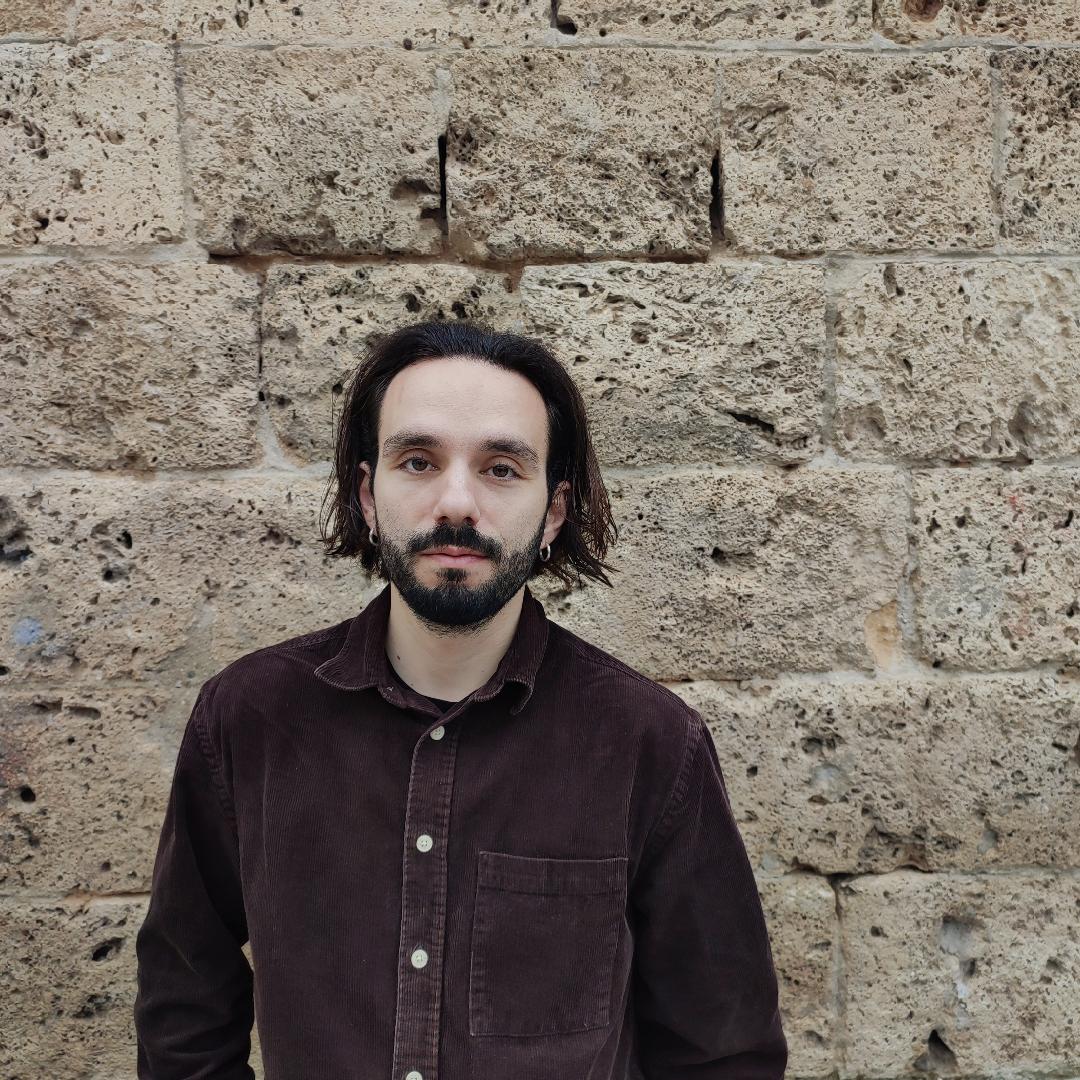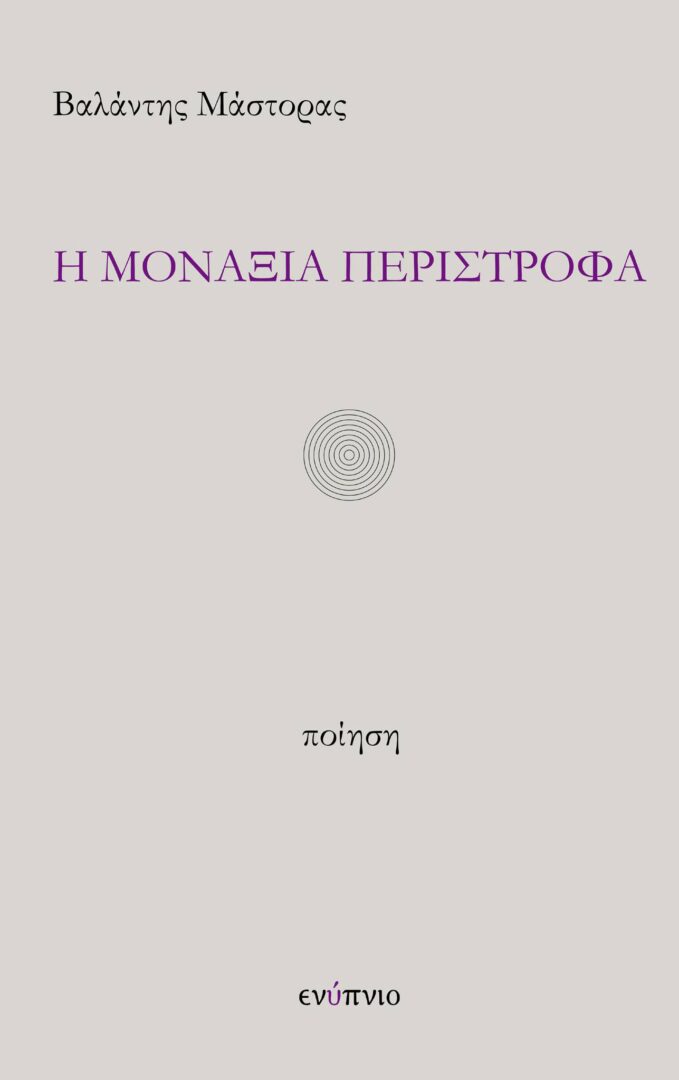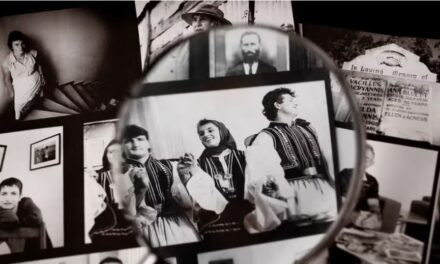Valadis Mastoras (1994) was born and raised in Igoumenitsa. He studied Applied Informatics at the University of Macedonia and Computational Linguistics at the University of Lorraine. He works in Thessaloniki in the field of his studies. H μοναξιά περίστροφα [Solitude revolve(r)s] (Enypnio, 2023) is his first book.

Your first writing venture Solitude revolve(r)s was just published by Enypnio. Tell us a few things about the book.
The book was written over the last three years and began as an attempt of mine to negotiate the condition of defeat, as well as the feelings of pain, loneliness and despair that stem from it. At the same time, my main motivation was the need to formulate a position of reaction against this condition. Eventually, I reckon that the book ended up being, above all, an urgent address to some collectivity, to some companionship. As for its structure, the book consists of 14 poems interspersed with 6 untitled bodies of verse that subtly divide it into sections. In particular, it is a book that was made to be read from beginning to end and in this sense, it is not just a collection of poems but aspires to constitute a complete poetic composition.
In your poetry, the individual is inextricably linked with the political. Where does the personal meet the collective in your poems?
In the book I strongly wanted to speak for all those who feel precarious and decimated in their lives. That is to say, I attempted to define and speak of a particular community, the community of all those who have been leveled by defeat and pain, who experience their loneliness intolerably and who have nothing left to hold on to but the slightest hope of a potential of rebellion — which, of course, carries absolutely no guarantee of success. I include myself among them. I, myself feel a member of this community, and when I say I write for this community, I mean that I write first and foremost about myself.
Generally speaking, the poetry I personally feel inclined to is the one that, originated from a deeply personal and individual trauma, fights its way to meet the respective collective trauma. Either way, and beyond literature, I consider that the way to negotiate our personal trauma is decisively mediated by the way we will try to respond to our collective condition and this is clearly a political dimension I aspire my poetry to delve into.
How is the existential anguish that characterizes your poems combined with more societal concerns?
For me, the socio-political is always deeply existential and this does not leave my poetry unaffected. In other words, I reckon that the need to give meaning to our lives through a political idea or a utopia, as well as the need to relate to other people in order to implement such a goal, is mainly initiated by our existential anxieties and the fears they bring. We want to improve our societies, because we simply want to live better and we feel the urge to do so because our life is the only certainty we have before we return to darkness anew.
That said, as far as the book is concerned, the truth is that when I was writing it, I was mainly focused on its socio-political dimension, more than any other. That is, what way my writing could contribute to broader social progress. But recently, as a good friend of mine pointed out, but also watching the book from a distance, I noticed that to a large extent a panoramic view of the world prevails in it (big battles, disasters etc.), rendering my poetry akin to a remote-spectator perspective. Therefore, I have come to think that this may have arisen precisely because the way I see the social and the political is through the existential. It may be an indirect comment on the scale we must always place things.
Your poetic language is characterized by a certain vulnerability, at times sarcastic, at others comforting and healing. What role does language play in your writings?
I think this is a very apt observation and probably testifies to the deeper quality of the poems. In other words, apart from the occasional use of a perhaps more ferocious and aggressive poetic language, I believe this book is mainly about vulnerability. I was feeling very vulnerable while I was writing it and that’s why I chose, as interlocutors or rather fellow travelers, all the correspondingly vulnerable people who survive in their hideouts all alone, to quote a verse from the book. Thus, in addition to talking about this vulnerability, it was clearly my concern also trying to relieve it, because after all, I believe that poetry should work in this way as well. Sarcasm opposes the condition that makes us vulnerable. Something like a combatant in the battlefield whistling nonchalantly while the bombers circle overhead. The next bomb might hit him in the head, there’s not much he can do about it, yet he continues to whistle and try to overcome in that way the dominion of fear.
As for language, I would say that it plays the most decisive role. However, I must admit that my relationship with language remains largely a mystery to me. To explain myself, I would say that my way of writing poems is always based on a dominant personal aesthetic. In this sense, I write in a way that is primarily intuitive and language-centric, which means that I almost never have a pre-determined topic that I want to write about and everything begins and ends within language. From then on, certainly like all people, I have my ideas and preconceptions and I suppose those somehow emerge when I write, but writing as such, happens almost in my absence. More precisely, at a junction, between someone who struggles to put words that make some sense in order and someone who observes this process without exactly understanding or participating in it. Therefore, what usually happens is that, in a not so comprehensible way, language itself comes and articulates with great clarity what I have often not even managed to perceive as requests within myself. So, what I mentioned earlier, that it was my concern to talk about vulnerability and alleviate it, is something that became clear as both a need and a goal through the process of writing and through language.

How does literature converse with the world it inhabits? Could literature be used to imagine what could be radically different realities?
For me, literature, like art in general, constitutes an expression of the deepest human demands and concerns at a certain historical period. That is, it emerges as a product of the world in which it is born and of course then returns as an autonomous creation to enrich the human experience and contribute to the relief, understanding and perhaps sometimes the assertion of these deepest demands and concerns. More generally, the literature that at least I am interested in, is on the one hand a tangible expression of the incompatibility of human desire and the respective objective reality, and at the same time, it is an act that requires the reconciliation of the two.
As for the second part of the question, I would like to focus particularly on the example poetry. I reckon that one of the main qualities of poetry, in which I am particularly interested in, is that it tries, and often succeeds, to familiarize us with the unfamiliar. One such example is when words drawn from completely heterogeneous and apparently incompatible linguistic environments come together, and despite all odds, there is caused a reading surprise, that without fully understanding why or how, becomes meaningful to us. Another such example is when we read a poetic image whose meaning we cannot fully analyze, yet it creates very unprecedented feelings and makes us feel, perhaps somewhat experientially, that at that moment something essential about our life and our world is brought to light. These for me are, among others, two characteristic examples of the familiarization I am referring to, that is, a kind of meaning and knowledge which I consider to have inherently radical characteristics because it helps us get closer to the unclear.
I believe it is precisely such kind of new perspectives that can play their own, decisive role in imagining alternative realities. That is, through a poetic language, we may not be able to precisely define realities that at the moment may seem abstract, distant and foreign, but we can, in a somewhat more emotional and personal way, begin to feel and imagine them. After all, I consider that the way we have to imagine and describe some of the vaguest, yet very important, concepts that concern humans (such as life or time) is eminently poetic. That is, removing empirical and scientific definitions, the way to talk about such concepts is through specific metaphors, such as for example life is a journey or time is money, etc., which, after all, are nothing more than poetic images that try on their part to add something to our understanding of these vague concepts. I imagine that before they were integrated into our everyday vocabulary and discharged of their poetic potential, these metaphors were also inspired through the same poetic processes that I am commenting on. So why can’t poetry, or at least poetic inspiration, do the same for our own utopias?
Which are the main challenges new writers face nowadays in order to have their work published? What role do the social media play in the promotion of new literary voices?
I consider that the main difficulty for new writers is to claim the visibility they deserve. It takes strong initiative and persistence in order to get their work read, mainly by publishers, but to a certain extent also by literature magazines/experts in the field. Of course, this is even more difficult when the newcomer does not come from known literary circles. In addition, many publishers usually require the new author to pay in advance the cost or part of the cost of the publication. This may be inevitable in some cases, especially for small publishers, but as a general publishing practice for newcomers, it makes commerciality a major criterion for publication, which I deem problematic, while creating a publishing landscape that excludes all those that don’t have the luxury to avail of such funds. Fortunately, there are still publishers who resist such practices.
As for the social media, both due to my scientific expertise and the generation I belong to, I am mostly favorably predisposed to them. I’m very interested in the democratization they bring about and how they change the paradigm of monopolies in information and promotion. For example, I recently did my first book presentations and had the opportunity to mass-promote them myself with quite a bit of ease. Nevertheless, if we talk more specifically about the promotion of a literary work, like for example a book of poetry, I reckon that it is usually difficult for a poem to “stand” on its own without a more comprehensive framework, that is, a context that will host it. Usually in social media poems are promoted disconnectedly and detachedly, thus risking becoming extremely one-sided. In other words, we are led to a logic of poems-slogans and verses-catchlines. I don’t want to belittle this, because it certainly has its value. The rhythms of everyday life are difficult and very fast and any way a verse intrudes reality to freeze this speed is very important for me. I just don’t think we should limit ourselves to that.
How do young Greek writers converse with global literature? Where does the local/national and the universal meet?
Young Greek writers, as young people nowadays in general, may perhaps be considered more than ever citizens of the world. Many of us speak more than one foreign language, watch news from the other side of the Atlantic, read poetry written in the Middle East, have studied abroad or are about to emigrate to look for better job prospects and so on. For such reasons, It’s only natural that the local has converged with the global and thus the literature we read, and therefore write, has undergone a corresponding internationalization. For instance, without being an expert in the field, I have lately noticed an emphasis on topics related to gender identities, feminism etc. in Greek literary production, which of course is closely related to the respective global debate and literary production around such issues. Such interrelations for me, also indicate, in practice, the way the local meets the global. That is, on the basis of our common traumas and concerns, but also of our transnational oppressions.
*Interview by Athina Rossoglou
TAGS: LITERATURE & BOOKS | READING GREECE



![Literary Magazine of the Month: [FRMK] and its Ten-Year Anniversary Issue ‘Tenderness-Care-Solidarity’](https://www.greeknewsagenda.gr/wp-content/uploads/sites/2/2024/04/frmkINTRO2-1-440x264.jpg)









